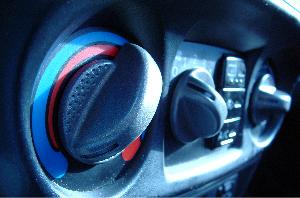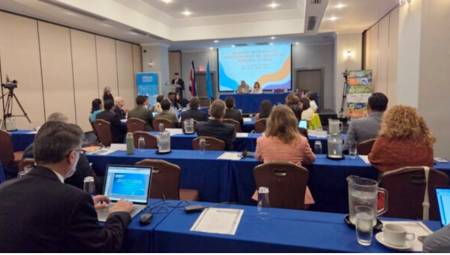 The economic crisis experienced by the automotive sector in 2009, definitely influenced the decrease in sales and imports of air conditioning systems for vehicles in several countries of the Southern Cone.
The economic crisis experienced by the automotive sector in 2009, definitely influenced the decrease in sales and imports of air conditioning systems for vehicles in several countries of the Southern Cone.By Santiago Jaramillo H.
Countries such as Argentina, Chile and Uruguay, which are the objects of analysis in this edition of the journal ACR LATINOAMÉRICA, were no strangers to the economic upheaval that took place in 2009 due to the international financial crisis.
These countries experienced firsthand the ravages brought about by the contraction of the markets and, therefore, the decrease in sales in the different segments of the economy became more than evident. But in the end, it was the automotive sector that was hit hardest by the crisis in this area of Latin America.
One of the clear manifestations of this was the low business results that companies in this sector showed in 2009. This situation was evident both in the fall in imports and in the result of sales and profitability compared to 2008.
The decrease in imports of auto parts, and in particular that of the entry into these countries of air conditioning systems are a very telling behavior of the difficult moment of the automotive sector the previous year.
The fall in the entry of air conditioning systems for vehicles according to the information and statistical system The Datamyne, is so telling that only in these three countries, Argentina, Chile and Uruguay, there was a weighted decrease that was around 50% (see tables of statistics).
It is worth clarifying that of the three countries under analysis, only Uruguay showed growth figures in imports, but not for the number of units brought to the country, but for the total value of the same that increased by 34.89% compared to 2008.
Vertiginous descent in Argentina
Car assemblers in Argentina resorted to various strategies in order to increase their sales, proof of this was the measure adopted at the beginning of 2009 in which it was determined to sell the basic models at cost, financed with credits subsidized by the State, this in order to maintain their production and protect employment in the sector in the face of the global crisis. However, the results at the end of the year were not as expected, and the decrease in the number of vehicles assembled and in sales were the main evidence.
The measure was part of the contingency plan launched by the third Latin American economy to stop the marked deterioration in its level of activity.
Regarding the entry of air conditioning systems for vehicles, the figures are dramatic, during 2008 the balance of imports reported by this South American nation indicated that 10,312 units entered the country for a value of FOB US $ 5,540,405, while in 2009 5,585 devices entered the country, worth US $ 3,058,621.
After the above, a decrease in imports in 2009 of 4,727 units and US$2,481,784 is inferred, representing a decrease of 45.84% and 44.79%, respectively.
Another particular evidenced by The Datamyne report is the increase in AC units for vehicles from Brazil, 59.39% of the systems that entered Argentina in 2009 come from this country. In 2008 the highest revenues, i.e. 48.78%, came from Europe. Despite this, the values of business with Brazil are lower by 67.34% compared to 2008.
The most important businesses of the gaucho nation in 2009 were advanced with Germany, to which it made purchases in the field of AC for vehicles for FOB US $ 1,388,303, the second was Brazil with US $ 1,054,226 and in third place was Japan with US $ 151,572.
The crisis also touched Chile
After a record year in car sales, with 239,835 units during 2008, the Chilean panorama in 2009 was diametrically different as it had a decrease that even reached levels above 50% in mid-2009 and led to the closure of several dealerships, the most notorious case being that of Persico, which declared bankruptcy the previous year.
More worrying figures reached the section of imports of air conditioning systems in the southern country, had a decrease of 61.11% compared to 2008. This is largely due to the fact that Chile does not have an automotive industry, but imports.
Last year Chile imported 13,339 units of automotive AC worth US$3,125,135, while in 2008 it bought 20,184 units costing US$8,035,034.
The largest trading partner in purchases was Mexico, a country from which FOB bought US$1,163,299 (37.22%), the second rung was for Japan with US$895,301 (28.65%) and the third place was achieved by the United States with US$406-415 (13.0%).
As for imported units, China was the largest supplier of AC, selling 5,815 units to Chile (43.65%), in second place was Mexico with 3,071 (23.05%) and in third place japan finished with 1,866 systems (14.01%).
Uruguay: small but growing
Sales of new cars in Uruguay last year 2009 amounted to 25,077 vehicles placed in the local market, 2.43% less than in 2008, according to information released by the Association of Automotive Trade of Uruguay (ACAU), based on information provided by brand dealers.
While the figure is no higher than the 25,701 units placed in 2008, it is well above the 16,660 zero kilometers sold in 2006.
In the import industry of air conditioning systems, Uruguayan importers brought to the country 221 units for vehicles, 18.75% less than in 2008, when they bought 272 devices worth CIF US$84,510. Purchases in 2009 totaled US$129,798.
In that order of ideas, Argentina was the country that sold the most to Chile, contributing 85 units (38.46% of the total); in second place was Brazil, which exported 59 products (26.70%); and Mexico, which contributed 30 AC systems (13.57%). In 2008, Brazil alone sold 230 units to the southern country, corresponding to 84.56% of total purchases for the year.
As for the most economically representative businesses, purchases from Argentina amounted to CIF US$59,569, representing 45.89%. The other sizable transactions ran on the side of France with US$28,474 (21.94%) and Mexico with US$17,520 (13.50%). In 2008, the main trading partner was also Brazil, which sold it US$50,619 (representing 59.90%).
Despite the unsatisfactory figures of 2009, most Latin markets have different, more encouraging, more cheerful perspectives, for what will be the consolidated sales and imports of 2010, since it is clear that the world economy has left behind the ghost of the crisis, so now a sweet taste haunts the segment of air conditioning systems for vehicles, that today, after perceiving more dynamic markets, sees good prospects to comfortably exceed the returns of 2009.













